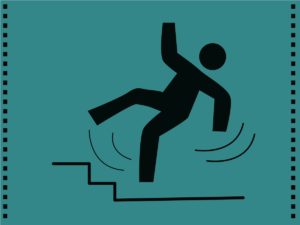When It’s Absolutely Obvious What Caused Your Fall-Down Accident
Posted January 9th, 2018 by Anthony Carbone, PC.
Categories: Personal Injury.
 As far as you’re concerned, someone needs to pay. It might not exactly sound like the politically correct way of approaching a personal injury claim. However, you are outraged. It’s absolutely obvious what caused your fall-down accident. There is no reason you should be laid up with a broken hip.
As far as you’re concerned, someone needs to pay. It might not exactly sound like the politically correct way of approaching a personal injury claim. However, you are outraged. It’s absolutely obvious what caused your fall-down accident. There is no reason you should be laid up with a broken hip.
If these words ring true to you, you are not alone. It’s not unreasonable to expect property owners to take care of hazardous conditions. Sure, you get that accidents happen. However, there’s no excuse for yours. Meanwhile, vengeance isn’t the reason you need to pursue a lawsuit. It’s more like medical bills piling up and the impact on your livelihood. Additionally, there’s a good chance that your fractured hip will have long-term consequences.
The truth is that there are two parts of every negligence claim. For starters, you must prove damages. Certainly, a substantial injury like a broken hip fulfills that category. Furthermore, you must show evidence of fault.
Proving the elements of negligence is critical to every personal injury claim. First, there’s the idea that the property owner owed you some duty. In the case of a slip and fall accident on residential stairs, homeowners should make sure the steps are in good order. Failure to do in a reasonable time period could be a breach of the duty to keep the stairway safe.
Next, there is the issue of causation. Did the broken steps cause you to fall? Ultimately, that will be crucial in determining whether or not you are entitled to damages as a result of your fall-down accident.
An investigation is vital when it comes to any type of injury claim. Slip, trip, and fall accidents are within the confines of premises liability lawsuits. An experienced premises liability attorney will gather evidence necessary to prove both damages and liability.
As far as establishing negligence, this includes determining the identity of the property owner, as well as taking photographs of the dangerous condition. In many cases, an engineering expert will provide a report after reviewing the area where the accident occurred.
Meanwhile, another type of liability expert may present an opinion regarding the circumstances that led to the incident. Notwithstanding, you might wonder if it’s always necessary to produce an expert. After all, some hazards are just downright obvious.
Fall-down Accidents and Expert Opinion
For the most part, it’s commonplace to secure expert opinion to substantiate negligence in a fall-down claim. However, in the case of Jacobs v. Jersey Central Power & Light Company, plaintiff’s counsel failed to so. Liability seemed far too obvious.
Here are the facts as presented in the court opinion. Nancy Jacobs was with someone else when she noticed that a streetlight lamp pole had fallen on her property. Subsequently, she made a report to Jersey Central Power & Light Company (JCP&L).
In response to the report, a JCP&L employee disconnected the light and removed a pole. Next, the worker wrapped up the leftover wires and placed them in the hole created by the missing pole. He then threw over some soil and covered the wires. Presumably, as a safety measure, the JCP&L subsequently placed an orange safety cone to mark the area.
No doubt the employee had good intentions. The only problem was that the safety cone disappeared. Additionally, no one returned to the hazardous condition to repair it and make it less dangerous.
Approximately two months later, Nancy Jacobs exited her home to retrieve her mail. As she walked over the unmarked area, she either fell over or into the hole. As a result, she hurt both her knee and back.
The case proceeded to trial and Nancy was awarded damages. The jury found that JCP&L was eighty percent liable for the accident. Meanwhile, Nancy’s comparative negligence amounted to twenty percent. As a result, Nancy’s award was discounted by twenty percent.
Notwithstanding, JCP&L appealed the judgment on a few issues. Among them was Nancy’s failure to produce testimony and opinion from a liability expert on utility industry standards. The power company stated that this was cause for a new trial.
In the end, the New Jersey Appellate Division agreed with the trial judge. There was no need for the jury to hear from a liability expert. JCP&L’s negligence was evident to the average layperson.
Contact Us
At the Law Offices of Anthony Carbone, we understand how crucial it is to prove damages and negligence in any personal injury case. Have questions? Contact us to set up a meeting to see how we can help you pursue your claim.


